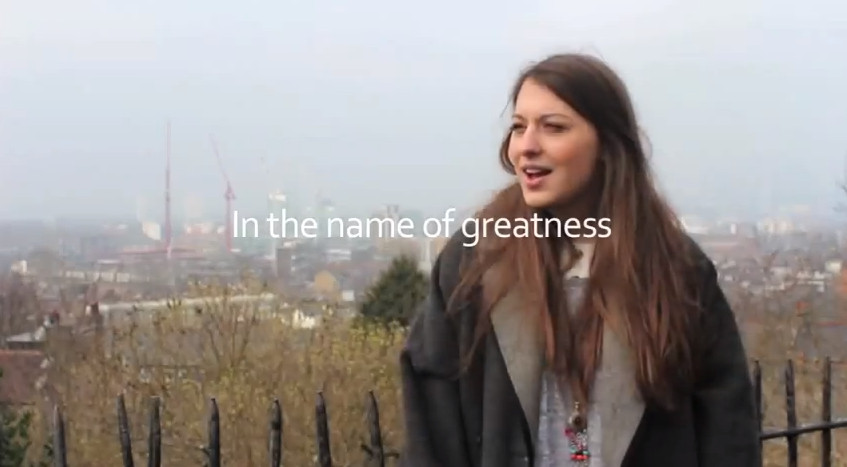Warwick students win film competition
Two students who have won a film competition speak to the Boar about the inspiration behind their work.
Dorothy Allen-Pickard, French and Film student, and Nicki Williams, English student, won the Intergenerational Foundation Film Competition for their short film entitled In the Name of Greatness.
The competition is in association with the Guardian and NUS. The video combines Nicki’s performance of her original poem with scenes around London to address the subject of being “young, gifted and broke in Britain”.
Dorothy explains that one of their main criticisms has been from commentators saying that Britain is not all bad: “But obviously we’re not trying to make a film presenting a patriotic image of London and Britain.”
You’re presenting one point of view; you can’t present every point of view, can you?
Dorothy: “Exactly.”
Nicki: “People seem to think that if you’re presenting a negative perspective of somewhere like Canary Wharf, which I find a really intimidating place, that you’re slamming London or Britain. But the whole point is that…”
Dorothy: “… It shouldn’t be the emblem.”
Nicki: “Exactly, we’re criticizing the fact that that shouldn’t be the image of London we know. Britain and London mean so much more than that. It’s meant to have a hopeful message at the end, it’s not all doom and gloom.”
Dorothy: “I don’t know how hopeful it is…”
Nicki: “I do, I think that’s what I wanted with the ‘ecstasy’ bit at the end.”
Dorothy: “Well, it’s giving advice and reflection.”
Nicki: “And how can you actually reach out to people in a meaningful way.”
And I’ve been there: it’s so bright it hurts me,
In its violent attempts to pull me into ecstasy,
I can feel it pulsing from the people next to me,
Feel it spread, trying to alter my identity-
But if you look at ‘ecstasy,’ etymologically,
It’s about being beside yourself,
Outside yourself,
To be for a moment someone other than yourself.
And isn’t that what’s needed to create a legacy?
To feel a sense of responsibility?
To sympathise and empathise and criticise and recognise
A place where we want to spend our lives?
How does the need for community drive the ideas in the video?
Nicki: “I think what we wanted to say was about actually reaching out to society and to people, in a real way. And basically the whole poem for me is just about recognising that you have responsibility.
“Building a shopping centre in Stratford that actually diverts everyone away from the real precinct in Stratford and filtering all that money out to giant corporations in no way helps the poorest areas of London.”
So shopping itself becomes a experience driven away from the community?
Nicki: “A society that is based on consumerism is an individual experience. You might go shopping with someone, but buying something is quite an alienating thing. It’s not a community thing.”
Dorothy: “Well it’s all to do with your perception of your identity and constructing an image, which is totally to do with constructing the self and so we have all of these little self-constructs who don’t actually kind of come together.”
The film is in part inspired by the extensive reading Nicki has carried out for her dissertation about consumerism, the Olympics and regeneration. She says this makes “the quite casual spoken word actually quite heavily researched”.
The political interests of the film are self-evident, and for Dorothy the documentary is the ideal medium because it “means usually: speak politics, speak certain resonant messages”.
Poetry videos are on trend at the moment; was that something you thought about before making the film together?
Dorothy: “I only realised once we’d won the competition to be honest!”
Do you think that helped you to win it?
Nicki: “I think there were a lot of things that were quite lucky. When Thatcher died, honestly it couldn’t have been better timed. It’s all about Thatcherism and when we made the poem, Thatcher wasn’t dead yet! And, it sounds awful to say, but it became ten times more relevant the day that Thatcher died.
“But as for video poetry, we didn’t really consider it – it was just a natural way for us to work together and develop each other’s projects. Then as it turned out, video poetry seems to be quite up and coming.”
Dorothy: “For me, what better way of communicating than just saying it through documentary. Plus it gives it this rhythm, which then reflects the video medium of editing. There’s a rhythm to film.”
What do you think poem means for students and young people?
Dorothy: “It’s kind of linked to Ken Loach’s film The Spirit of ‘45, a documentary about the need for older generations, who were there in 1945, to talk to our generation now and therefore will understand the importance of the welfare state and everything that was constructed around that time.”
Nicki: “For me, the way that it relates to students is the debt issue and ideas of what is useful to society – that is what needs to change.
“The whole idea of filming around Canary Wharf is that it’s the finance centre and that increasingly is becoming the way that we think of anything as useful, is in monetary terms. Seeing things on a human level rather than on a numerical, abstracted level where a person is a statistic.”
Dorothy: “And it’s so contradictory to go to university, learn all these ideas to ‘open your mind’ and then at the end of that, being told you should conform to quite a systematic channel, to get a job.”
Nicki: “And also that university has become a place for a transaction: you go in, you do the required number of essays and you get your degree. In the library, there’s a sign that refers to library users as ‘customers’ – that’s brazen!
“A brazen statement that the university is a business and we are the consumer.”

Comments